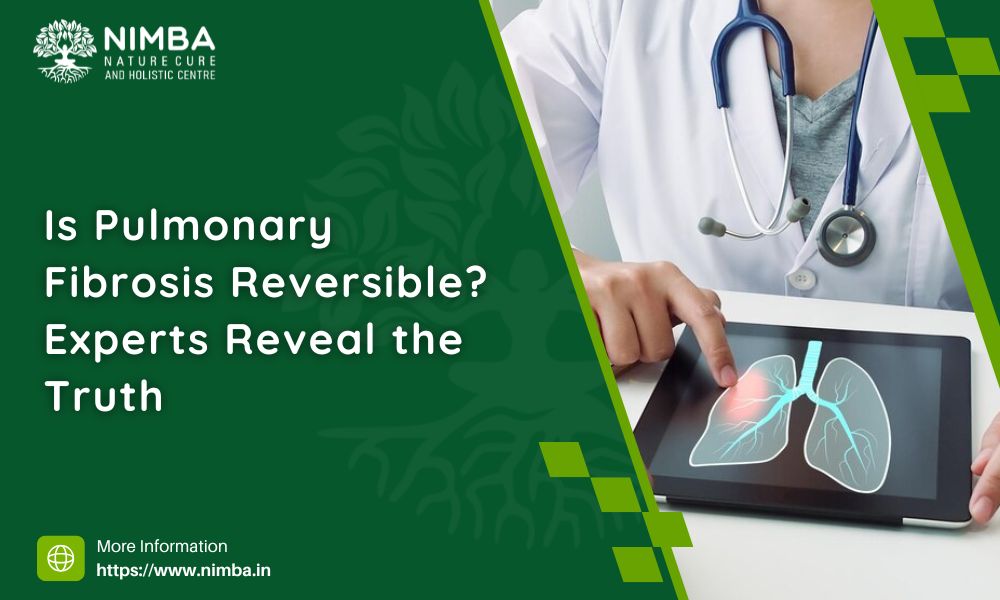Is Pulmonary Fibrosis Reversible? Experts Reveal the Truth
By: Nimba - February 18, 2025
Pulmonary fibrosis is a chronic lung disease that causes scarring of lung tissues, making breathing difficult. As the condition progresses, it limits oxygen flow to the bloodstream, leading to breathlessness and fatigue. While pulmonary fibrosis treatment cannot reverse lung scarring, various therapies can help manage symptoms and slow disease progression. This article explores the truth about pulmonary fibrosis and the best treatment options available.
Understanding Pulmonary Fibrosis
Lung tissue gets thick and scarred with pulmonary fibrosis, which over time reduces lung function. Though the precise aetiology of pulmonary fibrosis is unknown, several prevalent causes and risk factors are:
- Idiopathic Pulmonary Fibrosis (IPF): A form of pulmonary fibrosis with no known cause.
- Environmental Factors: Exposure to pollutants, asbestos, and silica dust.
- Autoimmune Diseases: Conditions like rheumatoid arthritis and scleroderma.
- Certain Medications: Long-term use of some chemotherapy drugs and antibiotics.
- Genetic Factors: A family history of lung diseases.
Is Pulmonary Fibrosis Reversible?
The sad fact is that lung scarring is permanent; hence, pulmonary fibrosis cannot be reversed right now. Unlike other lung diseases, such as asthma or bronchitis, where inflammation can be lowered and lung function restored, fibrosis marks structural damage the body cannot heal from. Though it cannot be cured, pulmonary fibrosis can be managed to slow down advancement and enhance quality of life.
Pulmonary Fibrosis Treatment Options
Though there is no cure, numerous treatments can help slow down the development of pulmonary fibrosis, ease symptoms, and increase lung capacity. These are the best strategies:
1. Medications to Stop Disease Progression
- Many drugs can assist to slow down lung scarring in pulmonary fibrosis:
- An antifibrotic medication, pirfenidone, lowers scarring and lung inflammation.
- Targeting several routes linked to lung damage, nintedanib helps slow down the course of fibrosis.
- Corticosteroids: Should pulmonary fibrosis be associated with inflammation, steroids could be beneficial.
2. Oxygen Therapy
Oxygen therapy helps individuals with pulmonary fibrosis breathe more easily and maintain oxygen levels in their blood. This treatment:
- Reduces breathlessness and fatigue.
- Supports overall organ function.
- Improves quality of life by enabling better mobility.
3. Pulmonary Rehabilitation
Pulmonary rehabilitation programs involve a combination of exercises, breathing techniques, and lifestyle adjustments to help individuals manage their symptoms. These programs typically include:
- Physical Exercise – Helps improve lung capacity and endurance.
- Breathing Techniques – Techniques like pursed-lip breathing can help manage shortness of breath.
- Nutritional Guidance – Maintaining a healthy weight reduces stress on the lungs.
- Psychological Support – Helps patients cope with the emotional challenges of living with a chronic lung disease.
4. Natural and Holistic Approaches
Some individuals explore natural remedies for pulmonary fibrosis to complement medical treatments. While these approaches do not reverse the disease, they can improve overall well-being:
- Herbal Supplements – Certain herbs, like turmeric and ginseng, have anti-inflammatory properties.
- Breathing Exercises – Practicing yoga and deep breathing techniques can enhance lung efficiency.
- Anti-Inflammatory Diet – Eating foods rich in antioxidants, such as fruits, vegetables, and omega-3 fatty acids, may help reduce lung inflammation.
- Acupuncture and Ayurveda – Some holistic therapies may provide symptom relief and improve lung function.
5. Lung Transplantation (For Severe Cases)
In advanced cases where lung function is critically impaired, lung transplantation may be considered. A lung transplant can offer a new lease on life, but it comes with significant risks and requires lifelong medical management.
Living with Pulmonary Fibrosis: Tips for Managing the Condition
Even though pulmonary fibrosis is irreversible, lifestyle changes can make a significant difference in managing symptoms and improving quality of life:
- Quit Smoking – Avoiding smoke and environmental pollutants reduces lung irritation.
- Stay Active – Engage in light physical activities to keep lungs functioning efficiently.
- Manage Stress – Anxiety and stress can worsen breathlessness; practicing mindfulness or meditation helps.
- Follow a Healthy Diet – Eating nutrient-rich foods supports overall lung health.
- Stay Up-to-Date with Vaccinations – Getting flu and pneumonia vaccines helps prevent complications.
Although early diagnosis and aggressive treatment greatly slow down the development of pulmonary fibrosis and enhance quality of life, the condition is not reversed. Combining medical therapies with holistic techniques can enable people lead happy lives and preserve lung capacity.
Seeking professional advice is absolutely vital whether you or a loved one is suffering from pulmonary fibrosis. At Nimba Nature Cure, we think about well-being holistically and use natural medicines and lifestyle changes to enhance lung health. Our specialists can help you control pulmonary fibrosis using a combined strategy that improves your general quality of living.
Looking for a Natural Approach to Pulmonary Fibrosis Treatment?
Discover how Nimba Nature Cure’s holistic therapies can help support your lung health. Contact us today to explore natural solutions for pulmonary fibrosis treatment!





